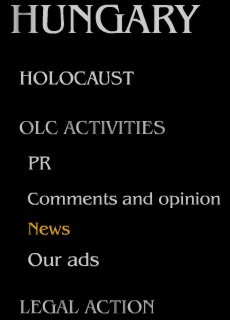|
Federal Home Affairs Minister Brendan O'Connor is refusing
to give accused war criminal Charles Zentai a complete
copy of advice he received prior to making his decision
to extradite the 88-year-old to Hungary.
Federal prosecutors advised the Government that there was insufficient evidence
to prosecute WA man Charles Zentai for a nazi war crime,
according to documents released under a court order.
The Commonwealth Director of Public
Prosecutions' advice was given to Home Affairs Minister Brendan
O'Connor before he authorised Mr Zentai's extradition to
Hungary last year - but was edited out of documents originally
released to his legal team.
Mr O'Connor's extradition order will
be challenged in the Federal Court next week by a pro bono
legal team led by Malcolm McCusker QC.
Mr Zentai, who is now a frail 88-year-old,
spent two months in Hakea Prison last year and is living
in Willetton on $75,000 bail.
His son, Ernie Steiner, questioned
why the Government's lawyers "blacked out" sections of a department submission quoting the DPP's advice. "There were very large sections of the submission that were redacted - or blacked
out," he said.
"It was only when Mr McCusker
applied for the documents in the Federal Court that this
came to light."
The Commonwealth DPP's office refused
to discuss the case and the minister's office did not return
calls yesterday.
The unedited document shows that in
2005, Australian Federal Police asked the DPP whether Mr
Zentai should be tried under the War Crimes Act.
The prosecution office advised that
while there was no legal barrier to prosecuting Mr Zentai
in Australia, "on the information presently known there was insufficient evidence to make out
a prima facie case against Zentai".
The AFP did not provide a full brief
of evidence for a "comprehensive assessment" of whether a case could be made out against Mr Zentai, who is accused by the
nazi-hunting Simon Wiesenthal Centre of being involved in
the murder of a Jewish student in 1944 in Budapest. Mr Zentai
was a conscript in the Hungarian army but claims he was not
in Budapest at the time.
The two witness statements implicating
Mr Zentai in the murder were both from men who are now dead,
and therefore could not be cross-examined in an Australian
court about claims they were tortured or induced to make
the statements.
"The CDPP understood that
there was no known eyewitness to support the allegation," the department advice said.
"This assessment was said
to be based fundamentally upon the absence of available witness
testimony to support any allegation of murder."
The department advised Mr O'Connor
that he should accede to the Hungarian Government's request
to hand over Mr Zentai for interrogation regardless of the
DPP's advice, or the fact that formal charges had not been
entered against him.
"In these circumstances,
any potential difficulties that may be indentified with prosecuting
Zentai in Australia for an offence allegedly committed in
Hungary may not be difficulties which arise in Hungary under
its different criminal justice system," the submission said.
Mr Steiner said extradition could
be a death sentence for his father, who had lived as a model
Australian citizen for 60 years.
"No reason whatsoever has
been advanced why, if the Hungarian authorities merely wish
to 'investigate' and question my father, they should not
do so by coming to Australia," he said.
"My father would not refuse
to speak to any credentialled investigator." au.news.yahoo.com
|


